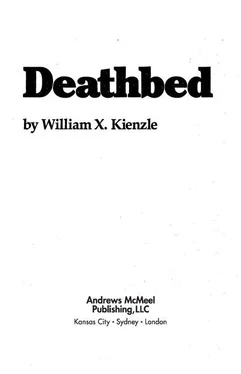“Church teaching?” Harold’s mind might be partially tuned to a conversation with Koesler, but his eyes were riveted to the TV set. “Oh, the ordinary magisterium, you mean.”
“Precisely. The good old ordinary magisterium—the ordinary teaching authority of the Church.”
“That’s when the Church isn’t teaching infallibly.” Harold was just making sure that hadn’t changed either.
“That’s right. And there are those who claim there’s been only one infallible statement since the doctrine of infallibility was defined a little more than a hundred years ago at the First Vatican Council.”
“The doctrine of the Assumption of the Blessed Virgin Mary into heaven, wasn’t it?”
“Right. So everything else—and that’s a lot—falls under the ordinary magisterium. And do you know how they came up with this medical code?”
“Just look at this, Father. This was the only goal the Red Wings scored last night.”
Koesler craned sufficiently to see the TV screen. He was just in time to see a red-suited skater sweep across the ice, receive the puck in a pass from his wing man, fake the goalie, and slide the puck inside the crease.
“They’re not doing very well, are they?” Koesler did not follow sports as faithfully as he once had.
Harold shook his head sadly. “Not like the good old days with the Production Line—Lindsay, Abel and Howe. Man, that Gordie Howe—what a player!”
“Those were the good old days, all right.” If he was no longer an avid jock, Koesler could at least remember. “And those blood-and-guts games against the Maple Leafs and the Canadiens!”
“Umm—excuse me, Father, what did you ask me about?”
“The Code of Medical Ethics. Know how they arrived at it?”
Harold shook his head. “Not rightly.” He returned to the TV.
“They asked for it.”
“Eh?”
“Catholic hospitals kept bugging the bishops to spell out medical moral ethics. Can you imagine that, Harold? Talk about the good old days ! Nowadays we hope the bishops and the Pope will keep quiet and not muddle things any more than they already have. Back then they wanted the word. And they surely got it. The bishops even sent the question of tubal ligation and material cooperation to the Vatican. And they got their answer. Now we have to live with it.”
Harold clenched his jaws. He didn’t care for talk that made light of the bishops and the Holy Father. But he was a guest in this rectory. And his parents had raised him to be well-mannered.
“So,” Koesler continued, “to return to my original question about why Fallopian tubes aren’t tied in a Catholic hospital: The reason is because the Vatican said so. That’s it.”
Harold felt compelled to say a word for Holy Mother Church. “But Father, that is the ordinary magisterium!”
“I know that, Father Harold. But to demur from the ordinary magisterium is not to be branded a heretic.”
“No, you’re not a heretic if you deny the ordinary magisterium. But you’re wrong.”
“That’s one view.”
“Oh, really, Father!” TV was disregarded. “I must object. I believe that Catholics may not dissent from Church teaching. And—not that I mean for a moment to presume to tell you your obligation—but pastors may not accept dissenting views in their parochial ministry. And finally, Catholics who have any doubt about Church teaching may suspend or withhold assent while they take every opportunity to resolve their doubt through study, consultation, and prayer.”
“In other words, Harold, Catholics who don’t agree with Church teaching may pray until they do agree.”
“You’re oversimplifying, Father.”
“Am I? What about our obligation to form our own conscience and follow it?”
“That’s true, Father. But the Church helps us form a true conscience.”
“Sure, Harold, the Church is supposed to help us. But in your explanation, the Church is not so much helping as it has taken over the whole job. Instead of working to inform our conscience and help form it, the Church simply invites us to pour our conscience in her mold and all the Catholics come marching out believing in, and judging everything in, identical ways.”
“Do you have another explanation?”
“I think so. Try this, Harold. Suppose, to begin, that we have an obligation to recognize the Church’s teaching role. And we also have an obligation to know what the Church is actually teaching. I mean, Harold, how many times have you had a discussion or an argument with someone only to eventually realize that the other person doesn’t really know what he’s talking about—that he doesn’t know what the Church actually teaches about a given point.”
“That’s true.”
“Okay, so we’re together so far. We recognize that the Church is an authentic teacher. And we must know correctly what the Church is teaching. Okay?”
“Okay.”
“Next step: If we’re uncertain or in doubt about a teaching of the Church, we give the presumption of truth to the magisterium. I think you’ll agree to that, too.”
“Right.”
“Okay, now for the final step. If it happens that our own experience and conviction—which we carefully and prayerfully reflect on—tells us that the Church’s teaching on a specific matter is inadequate, incomplete or inapplicable to our personal life, then we have the right—the responsibility— to depart from the Church’s teaching and follow our own well-formed convictions and conscience.
“What do you say to that?”
“Depart from the Church’s teachings! Oh, Father, I could never believe that!”
“How else could we possibly form our own conscience if we don’t have the freedom to do so?”
“But Father, the power of the keys! Christ said, ‘Thou art Peter and upon this rock I will build my church . . . and I will give you the keys of the kingdom of heaven. Whatever you bind upon earth will be bound in heaven. And whatever you loose upon earth will be loosed also in heaven.’”
“We’re all familiar with the ‘Tu es Petrus’ . . . text, Harold. But, like everything else in Scripture, you’ve got to put it in context. How did Peter conduct himself in the early Church?” Koesler continued, answering his own question. “Read the first twelve chapters of Acts with the idea of checking out St. Peter’s role in the Church. He does not have anything close to the power and authority of the Popes of recent memory. Peter is challenged not only by Paul in their famous confrontation; the entire Christian community—which was then entirely Jewish—calls Peter to task for admitting Gentiles into the Church. And later, Peter doesn’t just decide to take a trip as a missionary; the whole group sends him off.
“Peter’s role in the Church is not that of an infallible potentate, but a coordinator, a leader. And that’s what I think we mean when we call the Pope the successor of Peter. So, the ‘power of the keys’ maybe isn’t as absolute as we’ve been led to believe.”
“I don’t know, Father. I just couldn’t bring myself to disagree with Church teaching.”
“And nobody’s asking you to, Harold. My point is, there is more than one view of the teaching Church. And our separate views represent the thinnest line between a liberal and a conservative attitude toward the Church. There are, for instance, Catholics who would not grant the amount of time you so generously concede to conform one’s conscience to Church teaching. As far as these people are concerned, if you doubt, you’re out.
“On the other hand, there are liberal Catholics who would not offer the magisterium the benefit of the doubt, as I would. These people are convinced that at least most of the bishops are far more concerned about preserving the institution than searching out evangelical truth.
Читать дальше












